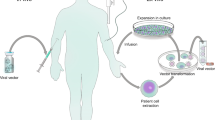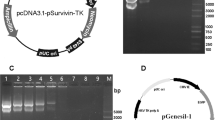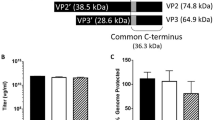Abstract
Midkine (MK), a heparin binding growth factor, and cyclooxygenase-2 (COX-2), a key enzyme in the conversion of arachidonic acid to prostaglandin, are both up-regulated at the mRNA or protein level in many human malignant tumors. Here, we investigated the tumor specificity of both MK and COX-2 promoters in human pancreatic cancer, with the aim to improve the selectivity of therapeutic gene expression. We constructed recombinant adenoviral (Ad) vectors containing either the luciferase (Luc) reporter gene under the control of the COX-2 or MK promoter or the herpes simplex virus thymidine kinase (HSV Tk) gene under the control of the COX-2 promoter and compared the expression with the cytomegalovirus (CMV) promoter. AdMKLuc achieved moderate to relatively high activity upon infection to both primary and established pancreatic carcinoma cells. Of the two COX-2 promoter regions (COX-2M and COX-2L), both revealed a high activity in primary pancreatic carcinoma cells, whereas in the established pancreatic carcinoma cell lines, COX-2L has an approximately equal high activity compared to CMV. In addition, both AdCOX-2M Tk and AdCOX-2L Tk induced marked cell death in response to ganciclovir (GCV) in three of four established pancreatic carcinoma cell lines. From these results, and because it has been reported that AdMKTk and AdCOX-2L Tk in combination with GCV did not reveal significant liver toxicity, we conclude that the MK as well as the COX-2 promoters are promising tumor-specific promoters for Ad vector–based gene therapy of pancreatic cancer. Cancer Gene Therapy (2001) 8, 990–996
This is a preview of subscription content, access via your institution
Access options
Subscribe to this journal
Receive 12 print issues and online access
$259.00 per year
only $21.58 per issue
Buy this article
- Purchase on Springer Link
- Instant access to full article PDF
Prices may be subject to local taxes which are calculated during checkout
Similar content being viewed by others
References
Manu M, Buckels J, Bramhall S . Molecular technology and pancreatic cancer Br J Surg 2000 87: 840–853
Pearson AS, Koch PE, Atkinson N, et al . Factors limiting adenovirus-mediated gene transfer into human lung and pancreatic cancer cell lines Clin Cancer Res 1999 5: 4208–4213
Von Hoff DD, Goodwin AL, Garcia L . Advances in treatment of patients with pancreatic cancer: improvement in symptoms and survival time Br J Cancer 1998 78: 9–13
Dmitriev I, Krasnykh V, Miller CR, et al . An adenovirus vector with genetically modified fibers demonstrates expanded tropism via utilization of a coxsackievirus and adenovirus receptor independent cell entry mechanism J Virol 1998 72: 9706–9713
Dmitriev I, Kashentseva E, Rogers BE, Krasnykh V, Curiel DT . Ectodomain of Coxsackievirus and adenovirus receptor genetically fused to epidermal growth factor mediates adenovirus targeting to epidermal growth factor receptor positive cells J Virol 2000 74: 6875–6884
Wesseling JG, Bosma PJ, Krasnykh V, et al . Improved gene transfer efficiency to primary and established human pancreatic carcinoma target cells via epidermal growth factor receptor and integrin targeted adenoviral vectors Gene Ther 2001 8: 969–976
Ilan Y, Saito H, Thummala NR, Chowdhury NR . Adenovirus-mediated gene therapy of liver diseases Semin Liver Dis 1999 19: 49–59
Ohashi M, Kanai F, Tanaka T, et al . In vivo adenovirus-mediated prodrug gene therapy for carcinoembryonic antigen-producing pancreatic cancer Jpn J Cancer Res 1998 9: 457–462
Kadomatsu K, Tomomura M, Muramatsu T . cDNA cloning and sequencing of a new gene intensely expressed in early differentiation stages of embryonal carcinoma cells and in mid-gestation period of mouse embryogenesis Biochem Biophys Res Commun 1988 151: 1312–1318
Eberhart CE, Coffey RJ, Radhika A, Gardiello FM, Ferrenbach S, DuBois RN . Up-regulation of cyclooxygenase-2 gene expression in human colorectal adenomas and adenocarcinomas Gastroenterology 1994 107: 1183–1188
Tsutsui J, Kadomatsu K, Matsubara S, et al . A new family of heparin-binding growth/differentiation factors: increased midkine expression in Wilm's tumor and other human carcinomas Cancer Res 1993 53: 1281–1285
Garver RI Jr, Radford DM, Donis-Keller H, Wick MR, Milner PG . Midkine and pleiotrophin expression in normal and malignant breast tissue Cancer 1994 74: 1584–1590
Aridome K, Tsutsui J, Takao S, et al . Increased midkine expression in human gastrointestinal cancers Jpn J Cancer Res 1995 86: 655–661
Uehara K, Matsubara S, Kadomatsu K, Tsutsui J, Muramatsu T . Genomic structure of human midkine (MK), a retinoic acid-responsive growth/differentiation factor J Biochem 1992 111: 563–567
Adachi Y, Reynolds PN, Yamamoto M, et al . Midkine promoter–based adenoviral vector gene delivery for pediatric solid tumors Cancer Res 2000 60: 4305–4310
Muramatsu H, Shirahama H, Yonezawa S, Maruta H, Muramatsu T . Midkine, a retinoic acid–inducible growth/differentiation factor: immunochemical evidence for the function and distribution Dev Biol 1993 159: 392–402
DeWitt DL, Meade EA . Serum and glucocorticoid regulation of gene transcription and expression of the prostaglandin H synthase-1 and prostaglandin H synthase-2 isozymes Arch Biochem Biophys 1993 306: 94–102
Hamasaki Y, Kitzler J, Hardman R, Nettesheim P, Eling TE . Phorbol ester and epidermal growth factor enhance the expression of two inducible prostaglandin H synthase genes in rat tracheal epithelial cells Arch Biochem Biophys 1993 304: 226–234
Ristimaki A, Honkanen N, Jankala H, Sipponen P, Harkonen M . Expression of cyclooxygenase-2 in human gastric carcinoma Cancer Res 1997 57: 1276–1280
Zimmerman KC, Sarbia M, Weber AA, Borchard F, Gabbert HE, Schror K . Cyclooxygenase-2 expression in human esophageal carcinoma Cancer Res 1999 59: 198–204
Tucker ON, Dannenberg AJ, Yang EK, et al . Cyclooxygenase-2 expression is upregulated in human pancreatic cancer Cancer Res 1999 59: 987–990
Inoue H, Nanayama T, Hara S, Yokoyama C, Tanabe T . The cyclic AMP response element plays an essential role in the expression of the human prostaglandin–endoperoxidase synthase 2 gene in differentiated U937 monocytic cells FEBS Lett 1994 350: 51–54
Inoue H, Yokoyama C, Hara S, Tone Y, Tanabe T . Transcriptional regulation of human prostaglandin–endoperoxidase synthase-2 gene by lipopolysaccharide and phorbol ester in vascular endothelial cells J Biol Chem 1995 270: 24965–24971
Yamamoto M, Alemany R, Adachi Y, Grizzle WE, Curiel DT . Characterization of the cyclooxygenase-2 promoter in an adenoviral vector and its application for the mitigation of toxicity in suicide gene therapy of gastrointestinal cancers Mol Ther 2001 3: 385–394
Herz J, Gerard RD . Adenovirus-mediated transfer of low density lipoprotein receptor gene acutely accelerates cholesterol clearance in normal mice Proc Natl Acad Sci USA 1993 90: 2812–2816
Garver RI Jr, Goldsmith KT, Rodu B, Hu P-C, Sorscher EJ, Curiel DT . Strategy for achieving selective killing of carcinomas Gene Ther 1994 1: 46–50
He T-C, Zhou S, DaCosta LT, Yu J, Kinzler KW, Vogelstein BA . A simplified system for generating recombinant adenoviruses Proc Natl Acad Sci USA 1998 95: 2509–2514
Graham FL, Prevec L . Manipulation of adenovirus vectors In: Murray EJ, Walker JM, eds. Molecular Biology, Gene Transfer and Expression Techniques Totawa, NJ: Humana Press 1991 109–128
Kurachi S, Deyashiki Y, Takeshita J, Kurachi K . Genetic mechanisms of age regulation of human blood coagulation factor IX Science 1999 285: 739–743
Yip-Schneider MT, Barnard DS, Billings SD, et al . Cyclooxygenase-2 expression in human pancreatic adenocarcinomas Carcinogenesis 2000 21: 139–146
Okami J, Yamamoto H, Fujiwara Y, et al . Overexpression of cyclooxygenase-2 in carcinoma of the pancreas Clin Cancer Res 1999 5: 2018–2024
Segawa T, Takebayashi H, Kakehi Y, Yoshida O, Narumiya S, Kakizuka A . Prostate-specific amplification of expanded polyglutamine expression: a novel approach for cancer gene therapy Cancer Res 1998 58: 2282–2287
Park BJ, Brown CK, Hu Y, et al . Augmentation of melanoma-specific gene expression using a tandem melanocyte-specific enhancer results in increased cytotoxicity of the purine nucleoside phosphorylase gene in melanoma Hum Gene Ther 1999 10: 889–898
Ring CJA, Harris JD, Hust HC, Lemoine NR . Suicide gene expression induced in tumor cells transduced with recombinant adenoviral, retroviral and plasmid vectors containing the ErbB2 promoter Gene Ther 1996 3: 1094–1103
Acknowledgements
This work was supported by the National Institute of Health Grants RO1 CA 74242, RO1 HL 50255, National Cancer Institute Grant NO1 CO-97110, United States Department of Defense Grants PC 970193 and PC 991018, the CapCure Foundation and Training Grant IT32 CA75930 to David T. Curiel, MD, and US Army Breast Grante DOD BC990177 to Igor Dmitriev, PhD. In addition, this work was supported from grants by the European Gastro-Surgical School (EPGS) at the Academic Medical Center of the University of Amsterdam and by the Netherlands Organization for Scientific Research (NWO). The authors thank H. Inoue and T. Tanabe of the National Cardiovascular Center Research Institute, Suita, Japan, for providing the plasmid phPES2 containing COX-2 promoter and Shuichiro Matsubara of the Kagoshima University, Kagoshima, Japan, as well as Takashi Muramatsu of the Nagoya University School of Medicine, Nagoya, Japan, for providing the MK promoter.
Author information
Authors and Affiliations
Corresponding author
Rights and permissions
About this article
Cite this article
Wesseling, J., Yamamoto, M., Adachi, Y. et al. Midkine and cyclooxygenase-2 promoters are promising for adenoviral vector gene delivery of pancreatic carcinoma. Cancer Gene Ther 8, 990–996 (2001). https://doi.org/10.1038/sj.cgt.7700403
Received:
Published:
Issue Date:
DOI: https://doi.org/10.1038/sj.cgt.7700403
Keywords
This article is cited by
-
The carcinoma-specific epithelial glycoprotein-2 promoter controls efficient and selective gene expression in an adenoviral context
Cancer Gene Therapy (2006)
-
Preclinical evaluation of transcriptional targeting strategies for carcinoma of the breast in a tissue slice model system
Breast Cancer Research (2005)
-
Molecular Targeting of Pancreatic Disorders
World Journal of Surgery (2005)
-
A promoter region of the midkine gene that is frequently expressed in human hepatocellular carcinoma can activate a suicide gene as effectively as the α-fetoprotein promoter
British Journal of Cancer (2003)
-
Cancer gene therapy: an awkward adolescence
Cancer Gene Therapy (2003)



